Microfinance, mountain-style
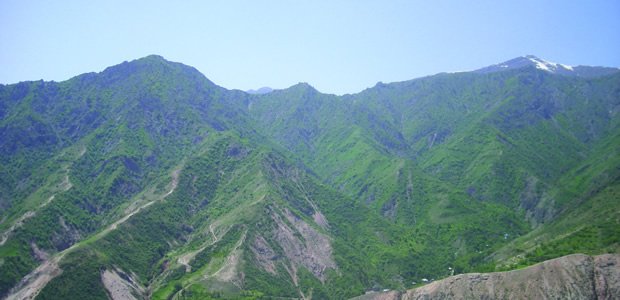
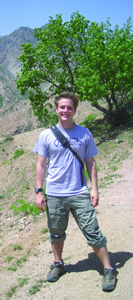 Peter on a weekend hike in a favourite Queen’s t-shirt.“You drive on scary mountain tracks to the applicant’s home. Then you have tea, meet the family, and share a huge spread of food and a few vodkas,” he says, describing the experience of assessing a loan for his employer, the First Micro Finance Bank of Tajikistan. “Then finally, you ride their donkey to see the fruit canning factory, or whatever the bank is considering investing in!”
Peter on a weekend hike in a favourite Queen’s t-shirt.“You drive on scary mountain tracks to the applicant’s home. Then you have tea, meet the family, and share a huge spread of food and a few vodkas,” he says, describing the experience of assessing a loan for his employer, the First Micro Finance Bank of Tajikistan. “Then finally, you ride their donkey to see the fruit canning factory, or whatever the bank is considering investing in!”
One of the highlights of his work is seeing directly how the people of Tajikistan – a former Soviet republic that borders on Afghanistan and is one of the poorest countries in the world – benefit from the bank’s microcredit activities. Since June 2007, Peter’s been living in the capital, Dushanbe, on a Fellowship in International Finance – offered by the Aga Khan Foundation Canada and the Canadian International Development Agency.
“Microcredit is a powerful development tool that enables people to lift themselves out of poverty through small business activity,” Peter explains. Helping the bank’s 16,000 clients – most of whom live in extreme poverty in remote areas – also stimulates the country’s ruined economy.
Most days, Peter is at the Bank, working closely with the CEO. He assists with business development, hosts international investors, writes policies, completes reports to secure international credit lines, and conducts research and financial forecasts. His projects range from developing a gender strategy for the bank, to penning procurement and human resources policies, to developing housing microfinance products.
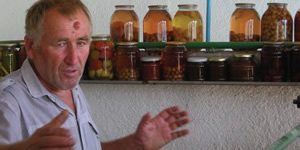 A Dushanbe shopkeeper One initiative Peter’s excited about is redesigning the Bank’s group loan products for women. Credit is provided for activities such as dressmaking, yak breeding, and beekeeping. “In a desperately poor country in which one-third of the men are working in Russia – 42% of the Gross National Product comes from remittances – female borrowers are of paramount importance to the Bank. Lending to women ensures the Bank meets its social objectives of targeting those most vulnerable in society. Women are also a lucrative market segment in the absence of the men who are working in Russia.”
A Dushanbe shopkeeper One initiative Peter’s excited about is redesigning the Bank’s group loan products for women. Credit is provided for activities such as dressmaking, yak breeding, and beekeeping. “In a desperately poor country in which one-third of the men are working in Russia – 42% of the Gross National Product comes from remittances – female borrowers are of paramount importance to the Bank. Lending to women ensures the Bank meets its social objectives of targeting those most vulnerable in society. Women are also a lucrative market segment in the absence of the men who are working in Russia.”
Peter’s decision to spend the year between graduation and grad school – he’s turned down three U.S. schools including Harvard, and is leaning toward attending Johns Hopkins University’s School of Advanced International Studies in Washington D.C. this fall – was inspired by the exchange program at Queen’s School of Business, he says.
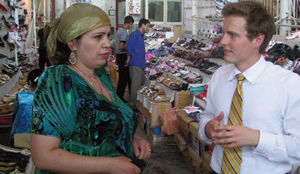 The Saidbarg market in downtown Dushanbe“I’m driven by the desire to enact social change,” Peter explains. “I learned a lot about emerging economic development while on exchange studying in Bangkok.” An internship at the U.S. Chamber of Commerce through the Washington Center program fueled his interest in international relations.
The Saidbarg market in downtown Dushanbe“I’m driven by the desire to enact social change,” Peter explains. “I learned a lot about emerging economic development while on exchange studying in Bangkok.” An internship at the U.S. Chamber of Commerce through the Washington Center program fueled his interest in international relations.
“Peter’s someone who wants to make a difference,” says Angela James, Director of the Centre for International Management, which coordinates exchanges. “While studying abroad he developed this ability to step outside of his comfort zone and embrace other cultures, which opens up amazing opportunities.”
Credit Is Provided For Activities Such As Dressmaking, Yak Breeding And Beekeeping.
Tajikistan is “by far the most challenging experience” he’s ever had, Peter confirms. Difficulties include working with economists and bankers from the Soviet system“used to taking orders and not to having leadership roles”; language issues created by working in Tajik, Russian and English – “a lot gets lost in translation”; and lack of North American-style basics such as human resources or procurement policies – not to mention regular electricity, peanut butter and good coffee.
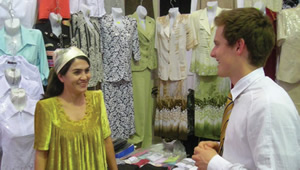 working with women borrowers is a priority“Every day living in Tajikistan is learning how to do things all over again,” Peter says with a laugh. Whether it’s his work to help the poor build a secure future through microcredit; showering out of a bucket during water shortages; eating lots of greasy soup and borscht; or joining in Tajik dances at office parties and weddings, Peter welcomes the experiences. “It stretches you to your limits. I love the challenges and rewards of international work.”
working with women borrowers is a priority“Every day living in Tajikistan is learning how to do things all over again,” Peter says with a laugh. Whether it’s his work to help the poor build a secure future through microcredit; showering out of a bucket during water shortages; eating lots of greasy soup and borscht; or joining in Tajik dances at office parties and weddings, Peter welcomes the experiences. “It stretches you to your limits. I love the challenges and rewards of international work.”
For more information, visit the First Micro Finance Bank and the Aga Khan Foundation in Canada’s site.
